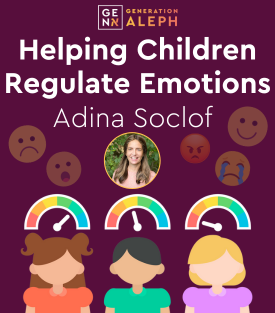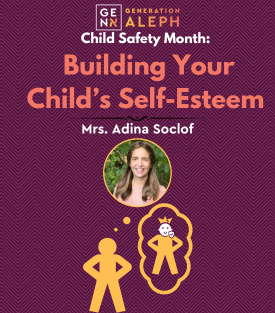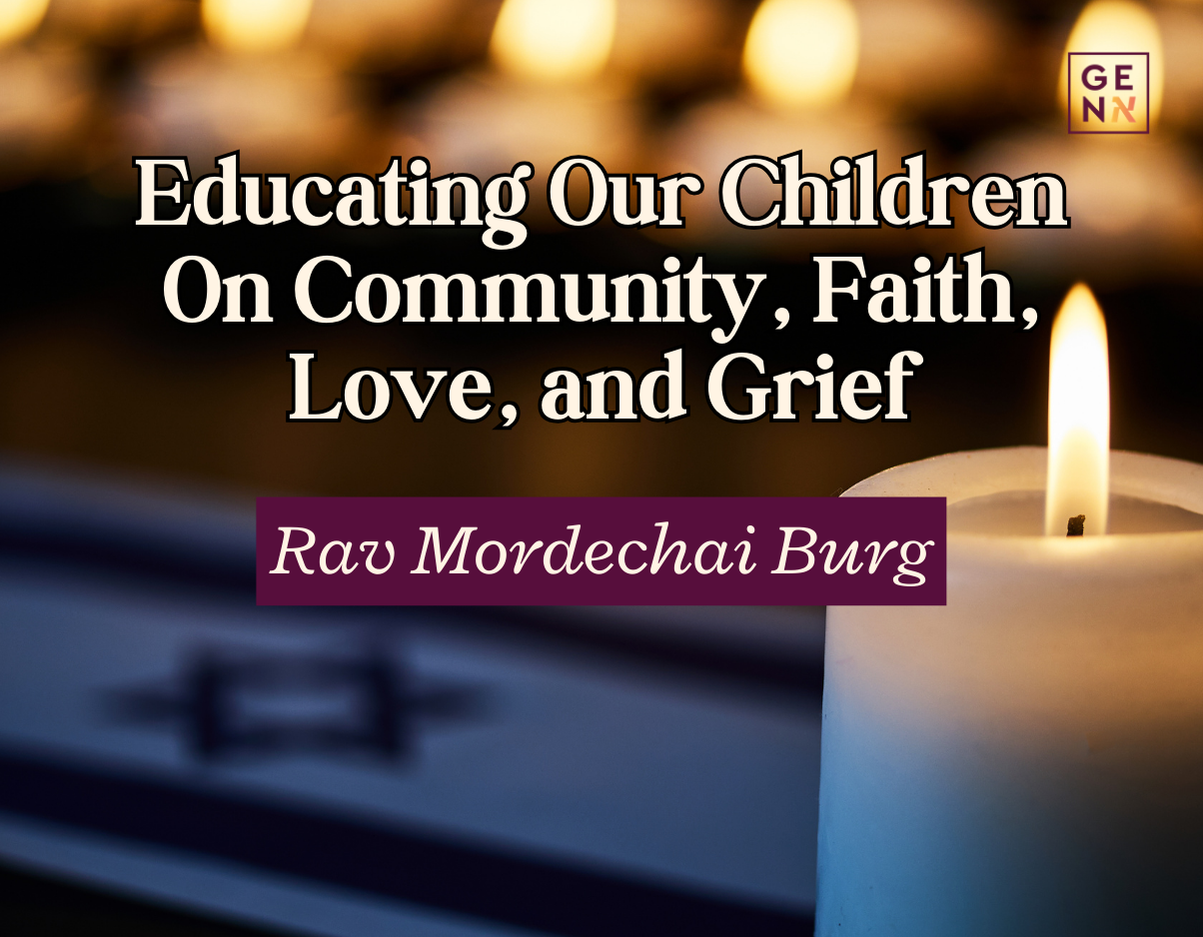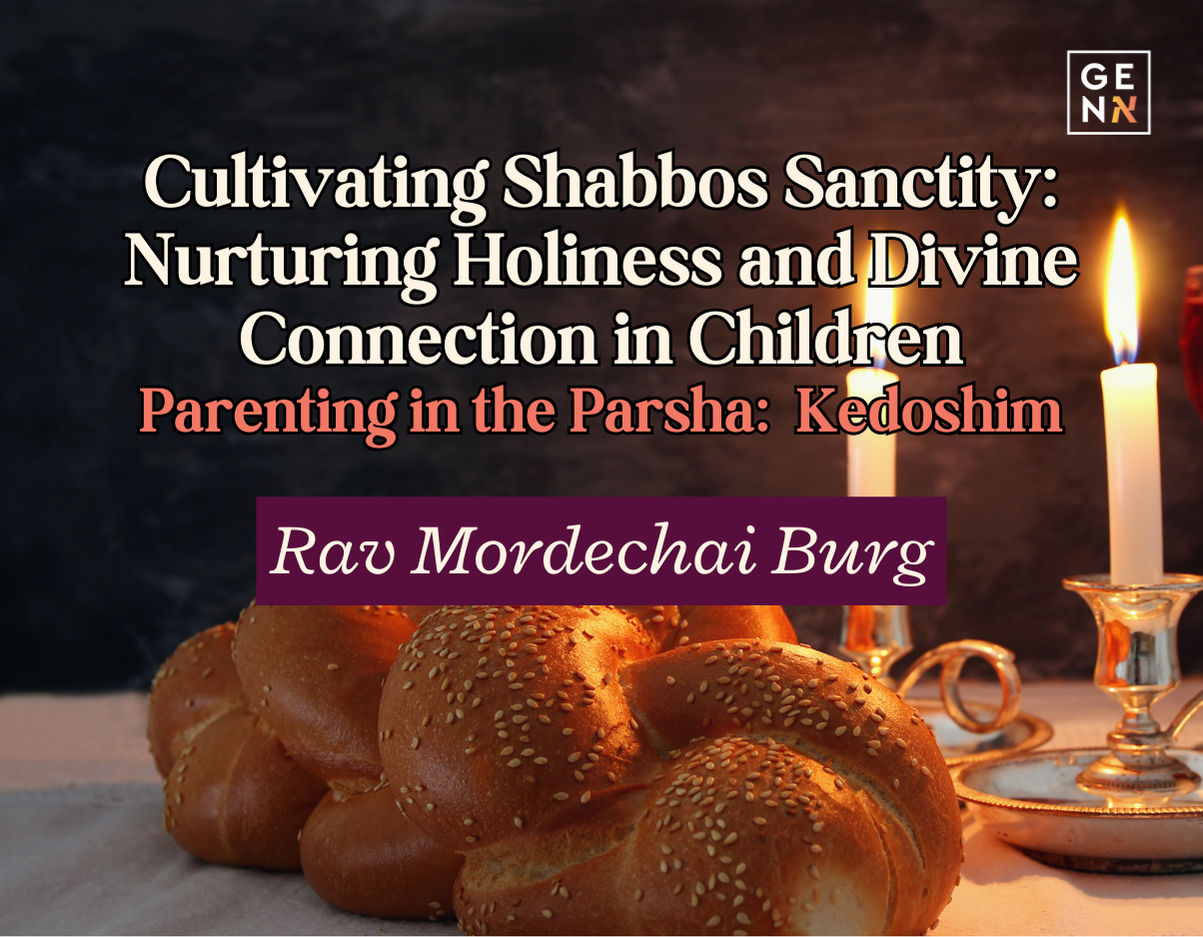וְהָיָ֞ה כִּֽי־תָבֹ֣אוּ אֶל־הָאָ֗רֶץ אֲשֶׁ֨ר יִתֵּ֧ן יְהֹוָ֛ה לָכֶ֖ם כַּֽאֲשֶׁ֣ר דִּבֵּ֑ר וּשְׁמַרְתֶּ֖ם אֶת־הָֽעֲבֹדָ֥ה הַזֹּֽאת: וְהָיָ֕ה כִּי־יֹֽאמְר֥וּ אֲלֵיכֶ֖ם בְּנֵיכֶ֑ם מָ֛ה הָֽעֲבֹדָ֥ה הַזֹּ֖את לָכֶֽם: וַֽאֲמַרְתֶּ֡ם זֶֽבַח־פֶּ֨סַח ה֜וּא לַֽיהֹוָ֗ה אֲשֶׁ֣ר פָּ֠סַ֠ח עַל־בָּתֵּ֤י בְנֵֽי־יִשְׂרָאֵל֙ בְּמִצְרַ֔יִם בְּנָגְפּ֥וֹ אֶת־מִצְרַ֖יִם וְאֶת־בָּתֵּ֣ינוּ הִצִּ֑יל וַיִּקֹּ֥ד הָעָ֖ם וַיִּשְׁתַּֽחֲוֽוּ:
And it shall come to pass when you enter the land that the Lord will give you, as He spoke, that you shall observe this service. And it will come to pass if your children say to you, What is this service to you? you shall say, It is a Passover sacrifice to the Lord, for He passed over the houses of the children of Israel in Egypt when He smote the Egyptians, and He saved our houses. And the people kneeled and prostrated themselves. (Shemos 12:25-27)
וְהִגַּדְתָּ֣ לְבִנְךָ֔ בַּיּ֥וֹם הַה֖וּא לֵאמֹ֑ר בַּֽעֲב֣וּר זֶ֗ה עָשָׂ֤ה יְהֹוָה֙ לִ֔י בְּצֵאתִ֖י מִמִּצְרָֽיִם:
And you shall tell your son on that day, saying, “Because of this, the Lord did [this] for me when I went out of Egypt.” (Shemos 13:8)
וְהָיָ֞ה כִּֽי־יִשְׁאָֽלְךָ֥ בִנְךָ֛ מָחָ֖ר לֵאמֹ֣ר מַה־זֹּ֑את וְאָֽמַרְתָּ֣ אֵלָ֔יו בְּחֹ֣זֶק יָ֗ד הֽוֹצִיאָ֧נוּ יְהֹוָ֛ה מִמִּצְרַ֖יִם מִבֵּ֥ית עֲבָדִֽים:
And it will come to pass if your son asks you in the future, saying, “What is this?” you shall say to him, “With a mighty hand did the Lord take us out of Egypt, out of the house of bondage. (Shemos 8:14)
In this week’s Parsha we encounter three of the four sons mentioned in the Haggadah. We are instructed to tell over the story of Yetzias Mitzrayim to the next generation and in order to do so we must consider the children that we are communicating with. After all, each child is different and thus each child requires a unique message about the Exodus from Egypt. It therefore seems appropriate to take a moment to analyze the sons that we encounter in this Parsha.
The Chacham
חָכָם מָה הוּא אוֹמֵר? מַה הָעֵדוֹת וְהַחֻקִּים וְהַמִשְׁפָּטִים אֲשֶׁר צִוָּה יְיָ אֱלֹהֵינוּ אֶתְכֶם? וְאַף אַתָּה אֱמָר לוֹ כְּהִלְכוֹת הַפֶּסַח: אֵין מַפְטִירִין אַחַר הַפֶּסַח אֲפִיקוֹמָן.
What does the wise one say? What are the testimonies, the statutes, and the laws that God, our God, has commanded to you? You should respond to him as the Torah commands, “We were slaves to Pharaoh in Egypt, etc.” and also instruct him in all the laws of Passover, up to and including its final law: “After eating the Passover offering, one should not then conclude the meal with dessert which would wash away the taste of the Passover offering.”
The first child is the intellectual child. He has no issues with the rational laws of Judaism, what bothers him are the Chukim, the supra rational laws. Why would God care if I put on Teffilin or keep Kosher? To him we say, let the taste of the Afikoman linger in your mouth. Matzah is the bread of humility. The humble person recognizes that our finite minds cannot grasp the infinite will and wisdom of Hashem. As parents it is imperative that we teach our children to understand that Hashem created our minds in order to be used in the service of Hashem. Smart children deserve intelligent answers. And yet, we must also teach them that the mind is bound by the finite. Humility means the recognition that not all is given over to logical interpretation. The intellectual child must be taught to use his mind in the service of Hashem while at the same time staying conscious of its limitations.
The Rasha
רָשָׁע מָה הוּא אוֹמֵר? מָה הָעֲבוֹדָה הַזּאֹת לָכֶם. לָכֶם – וְלֹא לוֹ. וּלְפִי שֶׁהוֹצִיא אֶת עַצְמוֹ מִן הַכְּלָל כָּפַר בְּעִקָּר. וְאַף אַתָּה הַקְהֵה אֶת שִׁנָּיו וֶאֱמוֹר לוֹ: “בַּעֲבוּר זֶה עָשָׂה ה’ לִי בְּצֵאתִי מִמִּצְרָיִם”. לִי וְלֹא-לוֹ. אִלּוּ הָיָה שָׁם, לֹא הָיָה נִגְאָל
What does the evil [son] say? “What is this worship to you?” ‘To you’ and not ‘to him.’ And since he excluded himself from the collective, he denied a principle [of the Jewish faith]. And accordingly, you will blunt his teeth and say to him, “‘For the sake of this, did the Lord do [this] for me in my going out of Egypt’ (Exodus 13:8).” ‘For me’ and not ‘for him.’ If he had been there, he would not have been saved.
Traditionally the Rasha is known as the wicked child however a more careful examination will show us that he is anything but wicked. The Baal Haggadah points out that in his question the “Rasha” is excluding himself from the community. In other words, the actions of this child may be the actions of a Rasha but they are driven by a lack of connection to the Tzibbur. As the old African proverb goes, a child who does not feel the embrace of the village will burn it down to feel its warmth. The child who is misbehaving, rebelling, acting out etc… may very well just feel unloved by the community. The solution of the Baal Haggadah is to smack him in the mouth. We must blunt his capacity to see himself this way. Every single child deserves to feel worthy of love and connection in our homes. As the Lubavitcher Rebbe explains, we tell this child that in Mitzrayim not everyone was redeemed. Indeed four fifths of Mitzrayim were left behind. But after Matan Torah every single Jew is redeemed. Hashem chose us to receive his Torah because he loved us for no reason. When someone is loved for no reason then there is never a reason to not love them. Thus after Matan Torah, every single Jew will be redeemed. In this way we communicate to the Rasha that he is a beloved member of our community regardless of his level of observance or lack thereof.
The Tam
תָּם מָה הוּא אוֹמֵר? מַה זּאֹת? וְאָמַרְתָּ אֵלָיו “בְּחוֹזֶק יָד הוֹצִיאָנוּ ה’ מִמִּצְרַיִם מִבֵּית עֲבָדִים”.
What does the innocent [son] say? “‘What is this?’ (Exodus 13:14)” And you will say to him, “‘With the strength of [His] hand did the Lord take us out from Egypt, from the house of slaves’ (Exodus 13:14).'”
Finally we come to the Tam, commonly known as the simple child. In truth, the word Tam denotes a sense of completeness. This child suffers (as we all do) from the delusion of control. Why do we need Hashem, the Tam asks. I am doing fine on my own. Why do I need to daven? I am not going to be struck by a bolt of lightning if I don’t put on Teffilin. In truth, we all have these issues in one form or another. How much do we recognize Hashem’s omnipotence in our lives? As one Rebbe put it to me, “Whenever I give a shiur about Emunah the audience asks me, “but what about Hishtadlus?” However, when I give a shiur about Hishtadlus, no one ever asks me, “but what about Emunah?”
It is imperative that we teach our children that with a strong hand Hashem took us out of Mitzrayim. As Chazal say, ואלמלא הקב”ה עוזרו אין יכול לו, if Hashem does not help us we are incapable. We cannot leave Mitzrayim on our own. All of our “successes” in life must be attributed to Hashem. If Hashem did not bless us with success then no matter how hard we tried, we could not be successful. The child who grows up in a home where he sees that his parents ascribe their success to a power greater than themselves grows up with a deep sense of appreciation of his role in the universe. There is a God above and I am not Him. Such a child is relieved from the anxiety of needing to “make everything happen” and can show up to life balancing influence and control.
In conclusion we have gleaned three critical lessons from the three sons we have examined.
- We must raise our children with the humility to understand that while Hashem gave them a mind to use in His service we must also recognize its limitations.
- Every single child must feel unconditionally loved from our community. They are redeemable because they are Hashem’s children irrespective of their performance.
- It is mission critical to raise our children with a deep consciousness of Hashem in this world. Only Hashem can take us out of the Mitzrayim’s in our lives.
_________________
Rav Mordechai Burg is the Menahel of Mevaseret, Mashpia of NCSY Summer, Mashpia of Nitzotzos, author of Nitzotzos on Chumash and a senior Rebbe at Tomer Devorah and Bnot Torah Institute. His shiurim can be found on Nitzotzos.com.
Submit your questions
"*" indicates required fields











